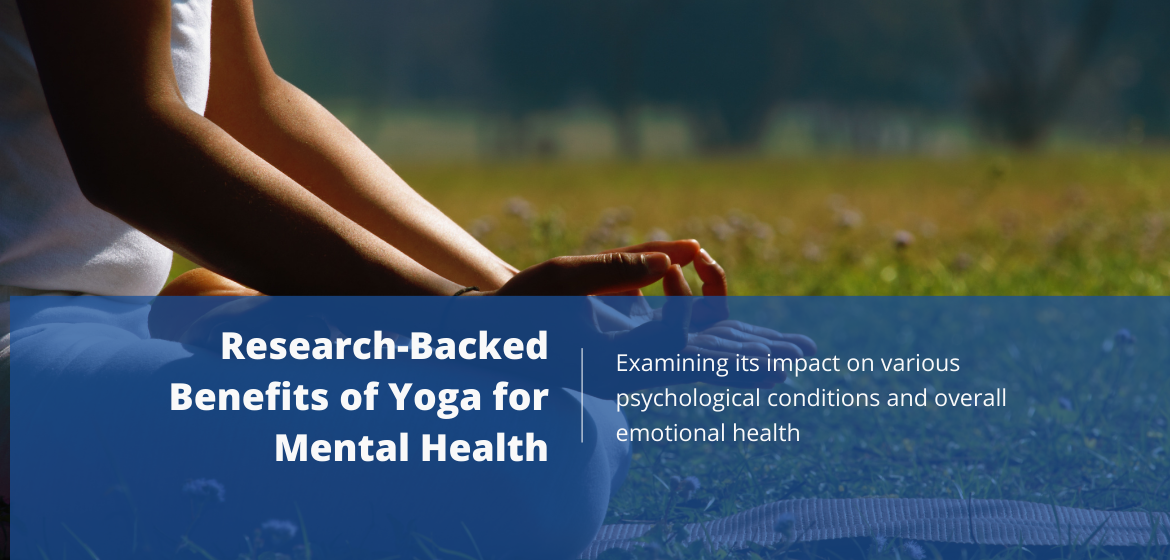
The Research-Backed Benefits of Yoga for Mental Health and Wellbeing
Yoga, an ancient practice that originating in India, has gained widespread popularity worldwide due to its numerous physical, mental, and spiritual benefits. Combining physical postures, breath control, meditation, and ethical principles, it offers a holistic approach to health and well-being. In recent years, a growing body of scientific research has explored and validated the mental health benefits of yoga. This article delves into the research-backed benefits of yoga for mental health and well-being, examining its impact on various psychological conditions and overall emotional health.
Stress Reduction
Stress reduction is essential for maintaining mental and physical health, and yoga is a powerful tool to achieve this. Through a combination of breath control, meditation, and physical postures, yoga helps to calm the mind, increase mindfulness, and enhance physical well-being. Regular practice reduces cortisol levels, alleviates anxiety, and promotes a sense of peace.
Yoga’s focus on deep, controlled breathing fosters relaxation and reduces stress response in the body. Additionally, the physical aspect of yoga improves flexibility, strength, and circulation, contributing to overall stress relief. Integrating yoga into daily routines can significantly enhance quality of life and stress management.
Key Research Findings
– A meta-analysis published in The Journal of Alternative and Complementary Medicine found that it significantly reduces cortisol levels, indicating its effectiveness in stress management.
Anxiety Relief
Yoga is an effective method for anxiety relief, combining physical postures, breath control, and meditation to promote relaxation and mental clarity. The practice helps lower stress hormones like cortisol while increasing the production of feel-good chemicals like endorphins. By focusing on the present moment and mindful breathing, yoga reduces racing thoughts and calms the mind.
The physical poses release tension in the body, improving overall well-being. Regular practice enhances self-awareness, resilience, and emotional balance, making it a powerful tool for managing anxiety. Incorporating yoga into daily life can lead to significant improvements in mental health and anxiety reduction.
Key Research Findings
– A review in Depression and Anxiety highlighted that yoga interventions significantly reduced anxiety symptoms in various populations, including those with generalized anxiety disorder, post-traumatic stress disorder (PTSD), and specific phobias.
Depression Management
Yoga is a valuable tool for managing depression, offering physical, mental, and emotional benefits. Through a combination of gentle movements, breath control, and meditation, yoga helps elevate mood and reduce symptoms of depression. Regular practice increases the production of serotonin and endorphins, the body’s natural mood lifters.
Mindfulness and deep breathing techniques in yoga promote relaxation and reduce stress, helping to alleviate feelings of sadness and hopelessness.
Yoga also fosters a sense of community and support, enhancing social connections. By improving self-awareness and emotional balance, yoga empowers individuals to manage depression more effectively and improve their overall quality of life.
Key Research Findings
– The Journal of Affective Disorders published a study showing that people who practice it, especially when combined with traditional treatments, significantly improve mood and overall mental health in individuals with major depressive disorder.
Emotional Regulation
Yoga is an effective practice for emotional regulation, combining breath control, physical postures, and meditation to enhance emotional balance. Through mindful movement and deep breathing, yoga helps calm the nervous system, reducing stress and anxiety. The practice promotes self-awareness, allowing individuals to recognize and process emotions more effectively.
Regular practice enhances the connection between mind and body, fostering resilience and emotional stability. Meditation techniques within yoga encourage a focused and peaceful mind, helping to manage negative emotions. By integrating it into daily routines, individuals can achieve greater emotional control, leading to improved mental health and overall well-being.
Key Research Findings
– Research in Mindfulness found that yoga enhances mindfulness and emotional regulation skills, helping individuals manage negative emotions and stress more effectively.
Mechanisms Behind Yoga’s Mental Health Benefits
The mental health benefits of the practice can be attributed to several physiological and psychological mechanisms:
- Neuroplasticity: Yoga promotes neuroplasticity, the brain’s ability to adapt and reorganize, which is crucial for cognitive and emotional resilience.
- Autonomic Nervous System Regulation: The practice helps balance the autonomic nervous system, reducing sympathetic (fight-or-flight) activity and enhancing parasympathetic (rest-and-digest) activity.
- Stress Hormone Reduction: It lowers levels of stress hormones like cortisol, reducing the overall stress burden on the body and mind.
- Mindfulness and Awareness: Regular practice cultivates mindfulness and self-awareness, helping individuals stay present and manage negative thoughts and emotions effectively.
- Physical Activity: The physical postures (asanas) improve physical health, which is closely linked to mental well-being.
Conclusion
The research-backed benefits of yoga for mental health and well-being are extensive and compelling. From reducing stress and anxiety to depression management and emotional regulation, it offers a holistic approach to mental health care. Its accessibility and adaptability make it a valuable practice for individuals of all ages and backgrounds. As the body of scientific evidence continues to grow, the practice is increasingly recognised as an effective and complementary treatment for a range of mental health conditions, promoting overall psychological resilience and well-being. Integrating it into daily routines can lead to profound and lasting improvements in mental health and quality of life.























